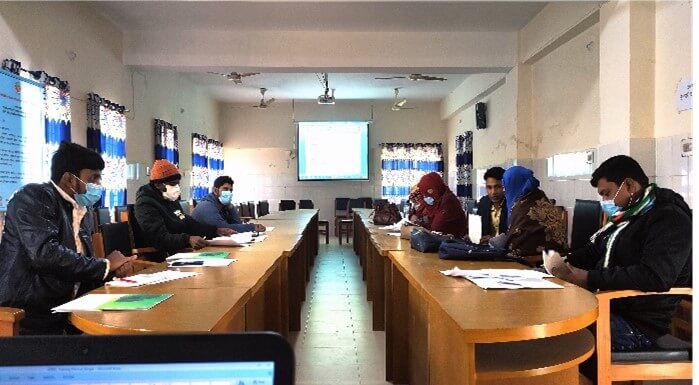Suicide Prevention and Implementation Research Initiative (SPIRIT)
Suicide Prevention and Implementation Research Initiative (SPIRIT)
Bangladesh Center for Communication Programs (BCCP) is currently implementing SPIRIT (Suicide Prevention and Implementation Research Initiative) with Indian Law Society, India in collaboration with Trimbos Institute, Netherlands; SNEHA- Suicide Prevention Centre, Chennai; Gujarat Institute for Mental Health (GIMH) & Hospital for Mental Health (HMH) Ahmedabad. The goal of the project is to bridge the gap between scientific evidence and practice in suicide prevention and mental health interventions in India and Bangladesh. The time frame of the project is August 2018 to July 2022 (48 months).
Community-based Suicide Surveillance: Key Findings from Pilot Study in Jhenaidah District of Bangladesh
Objectives:
- To bridge the gap between scientific evidence and practice in suicide prevention and mental health interventions through research partnership and by researching the implementation process of an integrated suicide prevention intervention in a community setting.
- To empower researchers and regional policy makers in South Asia to integrate evidence generated from implementation research on suicide prevention in policy making
 Suicide remains a major public health challenge globally. Every year, approximately one million people die due to suicide and there are many more who attempt suicide which represents a global mortality rate of 16 per 100,000. The average rate of suicide in Bangladesh is 8 per 100,000 per year (WHO 2014). But the rate is much higher in adolescents (15 - 19 years), at 17.1 in males, and 22.7 per 100,000 in females (Ahmed, M.K 2004). One community base survey revealed the rate as 128.8 per 100,000 population in a district of the south-west region of Bangladesh (Jordans MJ, 2014). These figures are likely to be an underestimate, as there is no systematic suicide surveillance system and no nationwide survey on suicidal risk factors has yet been conducted in Bangladesh. Report from police records, media, court, hospitals and the focused study on selected population are the main source of suicide data, which indicate suicide rate in Bangladesh is unacceptably high.
Suicide remains a major public health challenge globally. Every year, approximately one million people die due to suicide and there are many more who attempt suicide which represents a global mortality rate of 16 per 100,000. The average rate of suicide in Bangladesh is 8 per 100,000 per year (WHO 2014). But the rate is much higher in adolescents (15 - 19 years), at 17.1 in males, and 22.7 per 100,000 in females (Ahmed, M.K 2004). One community base survey revealed the rate as 128.8 per 100,000 population in a district of the south-west region of Bangladesh (Jordans MJ, 2014). These figures are likely to be an underestimate, as there is no systematic suicide surveillance system and no nationwide survey on suicidal risk factors has yet been conducted in Bangladesh. Report from police records, media, court, hospitals and the focused study on selected population are the main source of suicide data, which indicate suicide rate in Bangladesh is unacceptably high.
Global attention towards suicide prevention is articulated in the World Health Organization (WHO)’s Global Mental Health
Action Plan which set of targets of a 10% global reduction of suicide by 2020. The Sustainable Development Goals (Target 3.4.) also uses suicide rate as an indicator of health and wellbeing and established the goal to reduce deaths due to Non-Communicable diseases (including death by suicide) by one-third by 2030. To achieve this target, it is necessary to estimate the burden of suicide as well as to implement evidence-based intervention to result in a systemic change at the national level in reducing suicidal ideation,  suicide attempts and ultimately suicide rates.
suicide attempts and ultimately suicide rates.
Under SPIRIT, community-based suicide surveillance was piloted in Mehsana District in North Gujarat, India and a cluster randomized controlled trial in rural Gujarat, India and the protocol were published in most popular medical journals; BMJ and BMC journals. As part of capacity building core of SPIRIT, it is enhancing capacity for the Professionals of Mental Health field in Bangladesh. BCCP team participate training on ‘SPIRIT scale-up study on Youth Awareness of Mental Health (YAM)’, ‘Mental Health Gap Action Program (mhGAP)’ and ‘Centralized Pesticides Storage Facilities (CSF)’, held in Mehsana, Gujarat, India. Further, Online training was organized to strengthen the capacity of Bangladesh researchers on implementation research and community-based suicide surveillance. BCCP conducted a pilot study based on SPIRIT designed community-based surveillance system to understand suicide reporting system in Bangladesh. BCCP involved local health authority and multipurpose health volunteer (MHV) to implement the surveillance at community level. The study was conducted in three villages of Jhenaidah District of Bangladesh.
